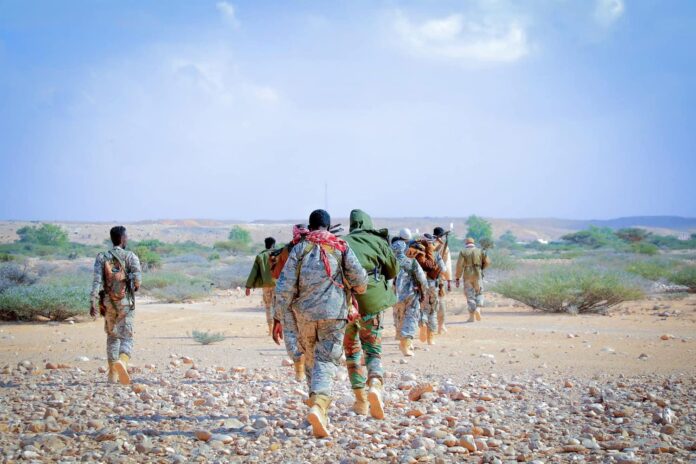BOSASO (Kaab TV) – Puntland authorities are intensifying investigations into ISIS’s exploitation of gold reserves in the mountainous Bari region, where the group is believed to be funding its terror activities through mining activities.
The focus on ISIS’s economic strategies follows a terror attack last Monday, in which Puntland security forces killed 12 ISIS fighters during a suicide car bomb followed by a raid by gunmen on an army base in Dharjaalle, a remote village in the Bari region.
Security forces successfully repelled the assault and later discovered the bodies of 12 militants, including fighters from Tanzania, Morocco, Tunisia, Comoros, and Ethiopia.
ISIS propaganda footage later confirmed their identities.
According to Puntland intelligence officials, foreign fighters form a substantial portion of ISIS’s presence in the region.
Many are experts in mining and mineral extraction, leveraging the region’s rich deposits of gold and other resources.
Local laborers are reportedly employed in mining operations, while residents in ISIS-controlled areas face financial extortion to avoid disruption of the group’s activities.
“They invaded our country to exploit our people and steal our resources,” said Abdirahman Mohamed Jama, the officer in charge of security operations for the Puntland Maritime Police, during a meeting with locals in Timirshe village on Saturday.
The Puntland officials alongside the maritime police, a unit trained by the UAE, are engaging local villagers in the area to help gather intel and warn against any local collaboration with the militants.
“The government will be here. We assure your security, and nobody will harm you,” said another officer, Mohamud Silal Omar.
The Bari region’s geography presents additional challenges for Puntland security forces.
Much of the area consists of remote fishing towns along the coast, giving militants unimpeded access to the sea.
This access has facilitated the movement of fighters and resources, as well as the smuggling of gold and weapons.
Puntland’s Deputy President, Ilyas Osman, stated last month that 80% of ISIS fighters in the region are foreigners.
Osman added that the group seeks to dominate areas near the Red Sea maritime route, a vital global trade corridor.
Both ISIS and Al-Shabaab are believed to acquire weapons from Yemen’s Houthi militia, further fueling concerns about the porous sea border between Puntland and Yemen.
Intelligence officers believe the gold extracted by ISIS in Puntland may be traded for arms, though it remains unclear whether the Houthis or other entities are involved.
Local officials state that the revenue from mining operations is likely funding destabilizing activities, including attacks on major cities like Bosaso, Puntland’s primary port on the Red Sea.
In response, Puntland authorities have launched the “Hillac Operation,” deploying thousands of troops to remote mountainous areas to dismantle ISIS’s operations.
President Said Abdullahi Deni emphasized that curbing ISIS’s financial lifelines, particularly from extortion of business community and gold mining, is critical to restoring regional stability.
The combination of resource exploitation, unregulated coastal access, and foreign militant involvement underscores the growing threat ISIS poses in Puntland and the broader Horn of Africa.
Security experts warn that without immediate and sustained intervention, the group’s operations could have far-reaching implications for both regional and international stability.


